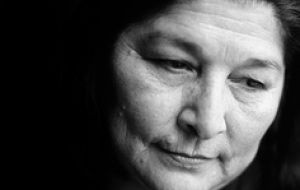MercoPress. South Atlantic News Agency
Last Argentine military Junta had plans to remain in power until 2000
 Julio Cortazar and Mercedes Sosa among the writers and artists blacklisted
Julio Cortazar and Mercedes Sosa among the writers and artists blacklisted Neatly kept and organized documents dating to the start of Argentina’s last dictatorship, 1976/1983, shows the names of activists who went missing and citizens blacklisted under the regime, officials announced in Buenos Aires. The documents also show that the military junta had planned to hold onto power until 2000.
“They found 280 original documents dealing with military juntas,” said Defense Minister Agustin Rossi at a press conference. Apparently the documents were found stashed in a basement of the Air Force headquarters in Buenos Aires.
The cache was found in two safes and in two closets, during a cleaning of the building’s basement, Rossi said.
The documents, the first major find of classified documents from Argentina’s so-called Dirty War of some three decades ago, have “immense historical value,” according to Rossi, who said that they include communications between various service branches at the time.
Human rights organizations — which for years have been demanding that the military open their files on Argentina’s dictatorship — also are likely to have a keen interest in the documents. They could hold immeasurable value as they continue their efforts to bring to justice those who prosecuted the war.
Some of the documents are expected to shed light on the fate of 30,000 opposition activists who disappeared during the dictatorship and are believed overwhelmingly to have been murdered.
Rossi said that the documents showed that the military junta had planned to hold onto power until 2000.
They are said to also include communications with Hebe Bonafini, head of the rights organization “Mothers of the Plaza de Mayo,” about her two children who went missing during the dictatorship and were never again heard from.
The find included a vast array of documents and photographs from the beginning of the March 24, 1976 coup through to its end in 1983.
The documents also include a blacklist of 153 Argentine artists and intellectuals, among them highly regarded writer Julio Cortazar who died in 1984, and legendary folk singer Mercedes Sosa who died in 2009.
Rossi said that the find raises expectations that officials could find even more documents that can illuminate the inner working of the dictatorship, and said that military officials would be encourage to “step up their search… in places that are not typical.”
Officials said they were first informed about the find last Friday, about a dozen people from Argentina’s humans rights office have been working to preserve the texts and photos and produce an initial catalogue of the find.




Top Comments
Disclaimer & comment rules-

-

-

Read all commentsI hope this shines a light into the darkest,filthy crevasses of this terrible regime and reveals all the cowardly collaborators,however always remember the extreme left begets extreme right,also Peron began as a military dictator.
Nov 07th, 2013 - 09:30 am 0Argentina needs to lose it,s obsession with him, he presided over a long decline ,
why o why must every political party from the loony left to the rabid right call it,s self Peronist!?
And there you have it. If Argentina had won the Falklands war, the odious Junta would have stuck around for at least another 18 years. All this crap about the war merely prolonging the Junta reign can be consigned to the rubbish bin. Britain effectively restored Argentina democracy... pity about the latest incumbents :-(
Nov 07th, 2013 - 09:59 am 0@2 So we can safely say that any argie that criticises Britain would have been your bog-standard fanatical supporter of the junta, right? Doesn't this tell us a lot? “It wasn't us. It was the junta”. No, it wasn't. It was you. “All the people dancing and singing in the streets in April 1982 were forced there”. No, they weren't. They were out there because they were immoral, cowardly criminals only too happy to see British nationals being attacked, invaded and occupied. Now watch for the argie cover-up.
Nov 07th, 2013 - 10:49 am 0Commenting for this story is now closed.
If you have a Facebook account, become a fan and comment on our Facebook Page!